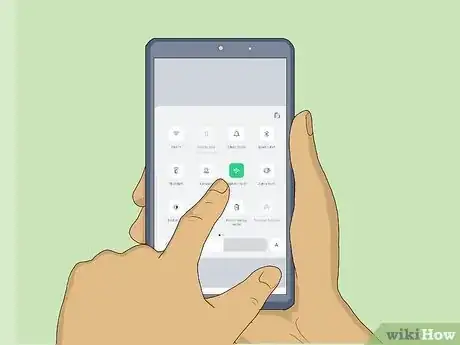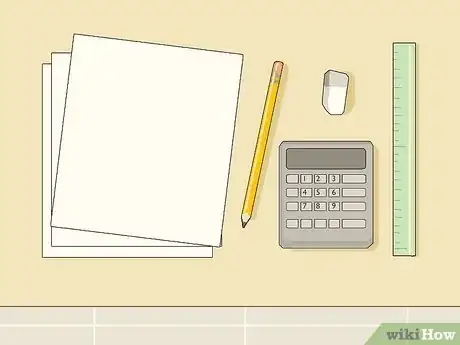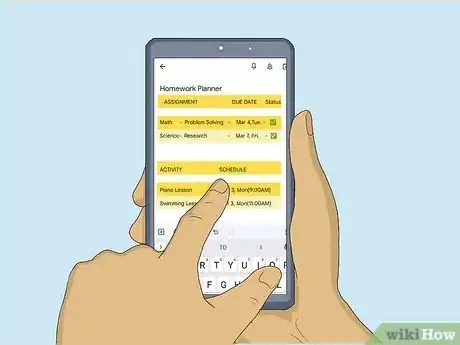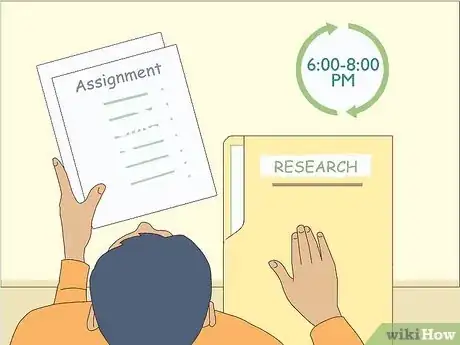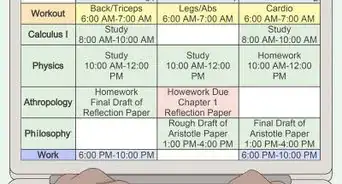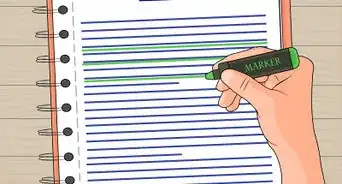This article was co-authored by Ashley Pritchard, MA and by wikiHow staff writer, Hannah Madden. Ashley Pritchard is an Academic and School Counselor at Delaware Valley Regional High School in Frenchtown, New Jersey. Ashley has over 3 years of high school, college, and career counseling experience. She has an MA in School Counseling with a specialization in Mental Health from Caldwell University and is certified as an Independent Education Consultant through the University of California, Irvine.
There are 9 references cited in this article, which can be found at the bottom of the page.
This article has been viewed 233,485 times.
Homework can be a drag, but it's got to be done to keep your grades up and stay on track during school. Going somewhere quiet, making a plan, and giving yourself breaks can all help you stay focused and on task to get your work done quickly. Try to keep your assignments organized and give yourself credit for completing hard or boring work, even if you didn’t want to.
Steps
Getting Motivated
-
1Pick an easy assignment to start with. If you’re having a really hard time getting started, you can ease yourself into homework mode by doing your easiest assignment first. Make sure you leave time for your hard stuff later on so you can get all of your work done.[1]
- Keep a list of your assignments and check them off as you finish them. This can give you a sense of accomplishment that can motivate you to keep going.
-
2Work on your homework with your friends to keep each other motivated. If you have a few friends who are also struggling to work on assignments, ask them if they'd like to form a homework group. Get together once or twice a week and work on your homework. You can work on the classes you have in common and ask each other questions, or you can work on assignments for different classes without talking.[2]
- Make it the rule that you work for a certain amount of time, or until a certain amount of work has been accomplished. Afterward, you can hang out. Stick to this schedule.
- Try this out and see if it works. If you're too distracted by having friends around, make a date to hang out after homework instead.
Advertisement -
3Make completing assignments a competition with yourself. Set goals for yourself and work to match them. If you always struggle with a certain kind of assignment, set a goal to learn how to do it better. Try to beat your last grade in each class to improve your overall score and GPA.[3]
- Make sure you keep the competition to yourself. Competing with your friends isn’t fun, especially over homework assignments and grades.
-
4Understand why you’re doing homework so it doesn’t feel pointless. It can be really hard to stay motivated when you don't have a clear sense of what the point is. Some homework assignments turn out to be useful eventually, but some never do. If you feel like your work is pointless, make a list of the reasons to do it.[4] Reasons to do homework include:
- Learning something that will probably help with future assignments, even if you don't know what they are yet.
- Proving to your teacher that you understand the homework so that they don’t keep assigning it over and over.
- Improving your GPA.
- Getting a good grade.
-
5Reward yourself when you finish an assignment. Set up a system where you get a small prize for every homework assignment or question that you do. You can reward yourself with 5 minutes of phone time, walking around the block, or even chatting with a friend. Whatever your reward is, make sure it’s something you’ll look forward to so you can motivate yourself.[5]
- Try not to reward yourself with food, as that can lead to snacking when you aren’t really hungry.
Staying Focused
-
1Break your work up into 45-minute chunks. As you start your first assignment, try to guess how long it will take you and then decide on a reward for finishing the assignment. Check the time, then try to finish the assignment in one shot. If it's a long assignment, break it into sections that will take less than 45 minutes each, and take a break in between sections.[6]
- For instance, tell yourself that if you finish your first assignment in 20 minutes, you can go on your phone for 5 minutes.
-
2Take 15-minute breaks. Every 45 minutes, take a break and walk away from your study area.[7] Breaks are the time to get your reward, to use the bathroom or get a glass of water, and to move a little. Taking a break can give your brain a short rest from your work so you come back feeling refreshed and energized.[8]
- Make sure you stand up and do something when it's your break, or you won't get your wiggles out.
- Set a timer on your phone or use a kitchen timer to let yourself know when it's time to switch tasks.
-
3Incorporate your own interests into your assignments. Whenever you have an assignment with a topic you can choose, pick something that really interests you. For instance, if you have to write a paper about the civil war, pick a historical figure who you really admire or really despise. Or, if you like making videos, ask your teacher if you can direct a short film instead of writing a paper. Topics that involve your feelings will be easier for you to think about for a long time.[9]
- If you don't have control over the subject, try to find connections between the topic and something you care about. Find aspects of the subject that interest you.
- For instance, if you have to study History but you care the most about fashion, investigate the styles of the times and places you are studying. Learn how political and economical developments changed the way people dressed.
-
4Listen to soothing music that isn’t distracting. It can be helpful to throw on some background noise when you’re trying to concentrate. Try playing some instrumental music or a playlist that’s made specifically for concentration to block out noise and keep you focused.[10]
- You can find playlists on Spotify and YouTube that are made for studying and doing homework.
-
5Turn off any entertainment when it’s time to focus on the hard stuff. If you get absorbed in your entertainment, you run the risk of forgetting to do your homework, or of doing a bad job. If you do choose to study with entertainment, turn it off (including your phone) once you're focusing on the hard stuff.[11]
- When you're struggling to focus, sign out of your email and all social media so you don't check them as a reflex.
Creating Good Study Habits
-
1Set up a dedicated workspace. As soon as you get home from school, gather everything you will need to do your homework in front of you. Lay out the materials for each assignment you are going to do, and clear anything else off your work surface to avoid distractions.[12]
- If you have many textbooks and worksheets, stack them and put them to the side.
- Get things like pencils, erasers, calculators, rulers, and paper.
-
2Keep a homework planner. Write all homework you are assigned in your planner, as well as when it is due. Write the other activities you have also: extracurricular activities, special events, and time with friends. Write down when you need to start each long-term assignment and how much you need to get done each day.[13]
- Having a planner will make it less tempting to procrastinate, as long as you have broken up your studying into manageable chunks.
- Your planner can be paper, or you can get one on your phone. Just make sure it has space for task lists as well as events.
- Once you have completed a task, cross it off or put a check next to it. Seeing that you're getting your work done will make you feel better, which in turn will motivate you to keep up the good work.
- Don't put more than you can do in one day on a list! Split up your week's work so that every day has a manageable amount.
-
3Stick to a weekly homework routine. You might want to get your work done right when you get home from school, or you might want to take a half-hour break first.[14] Schedule a few hours in the evening and on weekends dedicated to homework, studying, and completing assignments.[15]
- If you have a job or extracurricular activities that change your daily schedule, determine a weekly schedule that you stick to as much as possible.
-
4Get help with your homework if you’re struggling. If you are having trouble starting, or if you're just stuck on a problem, talk about the assignment with someone. Text or facetime a friend and chat about the homework you both have, or bring the assignment to a family member and ask them to talk about it with you. If you're stuck on something you don't understand, you can email your teacher.[16]
- Sometimes just explaining what you have to do will help you understand it better.
- Talking to another person is a great way to brainstorm ideas. They may ask you questions or provide comments that can help you organize your ideas.
- Other times, the person you are talking to will notice something about the prompt that you overlooked.
Expert Q&A
Did you know you can get premium answers for this article?
Unlock premium answers by supporting wikiHow
-
QuestionWhat happens if you have trouble with your homework, and you need help, but you don't want any help?
 Alexander Peterman, MAAlexander Peterman is a Private Tutor in Florida. He received his MA in Education from the University of Florida in 2017.
Alexander Peterman, MAAlexander Peterman is a Private Tutor in Florida. He received his MA in Education from the University of Florida in 2017.
Test Prep Tutor If you don't specifically want to ask help from another person, that's okay! You can always try other mediums first. There are many resources you can use online. Try a simple Google search and you'll be surprised how many question and lesson examples and discussions there are. This may help you self-teach yourself or review something you don't quite understand.
If you don't specifically want to ask help from another person, that's okay! You can always try other mediums first. There are many resources you can use online. Try a simple Google search and you'll be surprised how many question and lesson examples and discussions there are. This may help you self-teach yourself or review something you don't quite understand. -
QuestionWhat if you really have so much homework that there is no time for breaks but you feel tired?
 wikiHow Staff EditorThis answer was written by one of our trained team of researchers who validated it for accuracy and comprehensiveness.
wikiHow Staff EditorThis answer was written by one of our trained team of researchers who validated it for accuracy and comprehensiveness.
Staff Answer wikiHow Staff EditorStaff Answer
wikiHow Staff EditorStaff Answer -
QuestionI come home late, tired from school. Whenever I take a nap, it's already time for dinner. Even if I manage my homework, I have no time for revision and study. What do I do?
 wikiHow Staff EditorThis answer was written by one of our trained team of researchers who validated it for accuracy and comprehensiveness.
wikiHow Staff EditorThis answer was written by one of our trained team of researchers who validated it for accuracy and comprehensiveness.
Staff Answer wikiHow Staff EditorStaff AnswerTry to block out time during the school day to do some of your homework. You can try to work on it during break times, after you've finished lunch, or during a class period when you've finished your other assignments. If you get a jump start on your homework, you may be able to finish it in time to do some studying or revision.
wikiHow Staff EditorStaff AnswerTry to block out time during the school day to do some of your homework. You can try to work on it during break times, after you've finished lunch, or during a class period when you've finished your other assignments. If you get a jump start on your homework, you may be able to finish it in time to do some studying or revision.
References
- ↑ https://hwpi.harvard.edu/files/comm/files/smarttalk_staff_guide.pdf
- ↑ http://www.wcsu.edu/housing/wp-content/uploads/sites/55/2018/05/Handout-V6N6.pdf
- ↑ https://www.psychologytoday.com/us/blog/worry-wise/201410/how-prevent-homework-procrastination
- ↑ Ashley Pritchard, MA. Academic & School Counselor. Expert Interview. 4 November 2019.
- ↑ https://www.psychologytoday.com/us/blog/worry-wise/201410/how-prevent-homework-procrastination
- ↑ Ashley Pritchard, MA. Academic & School Counselor. Expert Interview. 4 November 2019.
- ↑ https://kidshealth.org/en/teens/homework.html
- ↑ Ashley Pritchard, MA. Academic & School Counselor. Expert Interview. 4 November 2019.
- ↑ https://hwpi.harvard.edu/files/comm/files/smarttalk_staff_guide.pdf
- ↑ http://kidshealth.org/en/kids/organize-focus.html?WT.ac=p-ra#
- ↑ https://www.stonybrookmedicine.edu/sites/default/files/homework_tips.pdf
- ↑ http://www.wcsu.edu/housing/wp-content/uploads/sites/55/2018/05/Handout-V6N6.pdf
- ↑ https://kidshealth.org/en/teens/homework.html
- ↑ https://childmind.org/article/strategies-to-make-homework-go-more-smoothly/
- ↑ https://www.stonybrookmedicine.edu/sites/default/files/homework_tips.pdf
- ↑ http://kidshealth.org/en/teens/homework.html#










